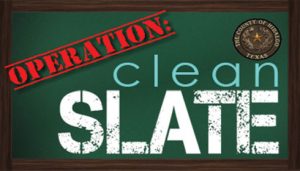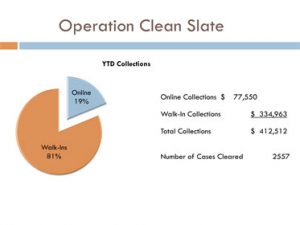Counties Step Up Delinquent Fine and Fee Collection
In an effort to boost county coffers and resolve millions in unpaid fines and fees, Hidalgo County launched a pilot program in September 2011 giving debtors the opportunity to “clean their slate before it’s too late.”
 “Operation: Clean Slate” targeted those owing money to the county’s justice of the peace courts for offenses such as speeding, driving without a license, or failure to appear, said Karina Cardoza, Hidalgo County public affairs director. The initiative included an outreach effort that utilized public service announcements, television and radio advertisements, and social media to raise awareness about unpaid debts and point residents to an online, searchable database where they could verify whether they owed money and pay their outstanding debt online with a valid credit card.
“Operation: Clean Slate” targeted those owing money to the county’s justice of the peace courts for offenses such as speeding, driving without a license, or failure to appear, said Karina Cardoza, Hidalgo County public affairs director. The initiative included an outreach effort that utilized public service announcements, television and radio advertisements, and social media to raise awareness about unpaid debts and point residents to an online, searchable database where they could verify whether they owed money and pay their outstanding debt online with a valid credit card.
The three-month program reaped more than $400,000 in new revenues.
“Clean Slate has demonstrated that the county is in an excellent position to increase its revenues through this previously untapped funding stream,” said Hidalgo County Commissioner Joseph Palacios. “The county will continue to ramp up its efforts to ensure a strategic collection mechanism is in place for the future,” Palacios added.
Hidalgo County officially launched Operation: Clean Slate on Sept. 15, 2011, when it unveiled the online database including some $35 million in fines and fees assessed by the county’s nine justices of the peace for minor offenses from January 2000 to April 2011.
“These monies have been owed to Hidalgo County for many years, and we are pleased with the response from the community,” said County Judge Ramon Garcia. “The convenience of paying online has proven to be a successful technique to allow residents to take care of their judicial obligations and pay their debt,” Garcia continued. “This project has been a tremendous success, and we will continue with these efforts to collect on what is owed to Hidalgo County.”
Cardoza said public interest from the 60-day trial period has led to efforts to expand upon the county’s database to include all monies owed to the courts, including fines and fees not included in the original database. The program could be expanded to allow residents to pay any fines they receive online rather than having to visit a justice of the peace office.

Since the conclusion of Operation: Clean Slate, Hidalgo County has been developing an “Enhanced Collections Program,” Cardoza indicated, to allow for greater enforcement of collection for scofflaws. The enhanced model will prevent those who have been skirting the law from registering or renewing their motor vehicles in the county, among other penalties. This enhanced program also aims to equip the county with the latest technology to provide a convenient method for residents to settle their debts online, at the justice of the peace courts, or at the tax office after being denied vehicle registration renewal.
The online payment portal will remain available to the public as Hidalgo County continues to develop its enhanced program.
Mandated Collection Programs
Back in 2005, the 79th Texas Legislature addressed county collections via the passage of Senate Bill 1863 requiring counties of 50,000 or more to develop and implement a program to collect court costs, fees and fines imposed in criminal cases to include district, county and justice courts, unless granted a waiver.
Believing that a local option program would be more efficient, county representatives requested that the 82nd Legislature repeal the mandatory provisions, as indicated by House Bill 2949, said Jim Allison, general counsel for the County Judges and Commissioners Association of Texas. This bill passed, was signed by the governor, and was to become effective on Sept. 1, 2011. However, during the ensuing special session, conferees nullified the actions of the regular session and resurrected the mandated program.
The mandated collections programs must:
- conform with a model developed by the Office of Court Administration designed to improve in-house collections through application of best practices; and
- improve collection of balances more than 60 days past due, which may be implemented by entering into a contract with a private attorney or public or private vendor.
Outsourcing Collections
Refugio County is located on a major thoroughfare “from the Valley to Houston onward, and we needed additional help to collect the pending amount of delinquencies,” said Justice of the Peace Emi Riemenschneider.
The county initiated a contract with Graves Humphries Stahl, Ltd., in 2011 and has noted a significant increase in collections.
“This has greatly benefited our county,” Riemenschneider maintained.
Williamson County Justice of the Peace Precinct 4 decided to outsource collections in February 2010 to pursue outstanding debts more than 60 days past due. The county signed with Linebarger Goggan Blair & Sampson, LLP.
“It is more efficient to use an outside agency that has additional resources at its disposal to try to locate these individuals,” stated Justice of the Peace Judy Schier Hobbs.
Cooke County Justice of the Peace Precinct 1 “was working with a very short staff,” said Judge Dorothy Lewis. The county signed on with Perdue Brandon Fielder Collins & Mott‚ LLP, in 2007. The outside firm sent out mass mailings on old cases, and the county not only noted an increase in collections, but an internal relief.
“What really helped so very much was the work it removed from my staff,” Lewis explained.
In 2004 Polk County noted some $1 million in outstanding fines and fees in its four justice of the peace courts combined and initiated its partnership with an outside collection source, ultimately contracting with McCreary, Veselka, Bragg & Allen, P.C.
“This decision to use an outside firm has increased our collections,” said Precinct 1 Justice of the Peace Darrell Longino. In fact, Polk County has now added county court delinquent fines to the program.
By Julie Anderson
















